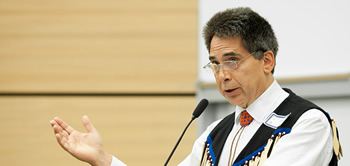On November 3rd, UBC opened the Centre for Interactive Research on Sustainability (CIRS), the most sustainable building in North America. Kwes Kwestin (Jim Kew), Cultural Representative for the Musqueam Indian Band, spoke to attendees at the opening celebration on behalf of Musqueam. Read his full remarks below.
More information on CIRS
Learn more about Musqueam
Kwes Kwentin Speaking Notes for the November 3, 2011 CIRS Opening Celebration
As the Representative of Musqueam Nation, who hold the underlying title to this land, and on behalf of your host – the University of British Columbia – I welcome you to the Centre for Interactive Research on Sustainability. It is a singular honor to speak here today on behalf of my ancestors, and my people, and the University, where my father taught for many years.
My Musqueam name is Kwes Kwestin, a hereditary name carrying an obligation to my ancestors. When I was given this name at the age of six, I was given the duty in my lifetime to carry this name as an agent of change, working to bridge the cultural gap between Canada and Musqueam. In this way I bring honor to my grandfather, and our ancestors who have carried this name before us. In fulfillment of this solemn duty I was one of the elected council who twenty years ago signed the Statement of Intent to negotiate a Treaty between Canada and Musqueam; a process driven both by litigation, and social change.
I would like to tell you why this is important to me. Before the Spanish arrived there were about 25,000 of us. By the 1920’s there were less than 100 of us. My elders told me of a time when the salmon run filled the river from bank to bank with flashing bodies, as far as the eye could see, upstream and downstream; a time when flocks of birds blocked out the sun.
This change is part of a worldwide change in search of political harmony; a change which has created the opportunity to achieve environmental harmony. I salute Strategic Partners Haworth and Modern Green; Haworth for their support of Global Sullivan Principles used in the advancement of human rights at the international level; and Modern Green because Chinese Canadians played an integral part in the extension of the provincial franchise to First Nations. In my lifetime First Nations were enfranchised to vote in the federal election of 1967, we were allowed to hire lawyers in 1975, and the 1982 Charter of Rights and Freedoms which eventually was extended to First Nations, essentially recognized us as human beings. In 1991 Musqueam signed the Statement of Intent to conclude a Treaty with Canada.
Gradual social change has been the key to the emergence of Musqueam’s basic human rights. It is social change as represented here today that brings our diverse cultures into alignment. Speaking as Kwes Kwestin, with the voice of my ancestors, I am deeply moved that environmental sustainability, a concept sacred to my people, has now entered the academic culture of Canada.
Musqueam and the crown have resolved some of our outstanding differences here at UBC. Musqueam and the University now share the interest of environmental sustainability through a collaborative planning process for the development of adjacent lands that is both current and directly related to the purpose of this building. Consequent to this history, and in consideration of our underlying title to the land, I feel that Musqueam too is a partner in the Center for Interactive Research on Sustainability. The warmth you feel from this buildings geothermal heating system is in a very real way a Musqueam contribution. Please accept this warmth as the blessing of my ancestors, and my people. Our blessing, our forgiveness, and our experience acquired through thousands of years of engagement with the spirits of the earth are our contribution to this magnificent undertaking.
